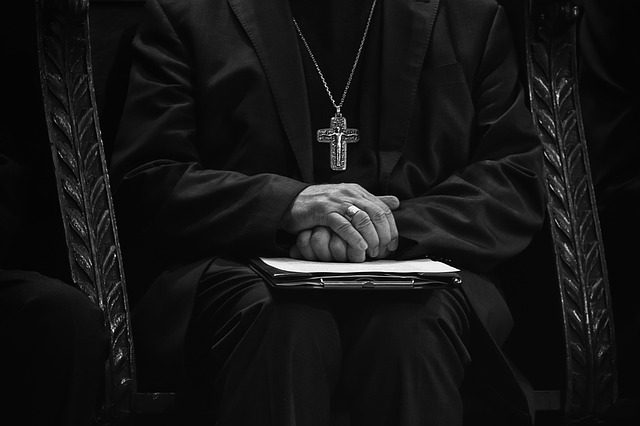
Sometimes, even though I ought to be used to it by now, I am overwhelmed with shock at the absolute cluelessness of our Catholic bishops. I shouldn’t be. They’ve always been clear about who they are. But still, today, I’m shocked.
Bishop Robert Barron, the auxiliary bishop of Los Angeles, is what counts for media-savvy for a member of the USCCB. He’s considered one of the hip bishops that has a better understanding of the plight of young people. He recently sat down for an interview with Our Sunday Visitor, which aired yesterday. In this interview he talks about the crisis of the “Nones,” the people who leave the Church and do not join another religion but remain unaffiliated. And I am going to dialogue with his answers. The italicized paragraphs are Barron’s words, quoted from the linked article.
I’ve been tracing this phenomenon [of people leaving the Church] for some time, and there has been a steady increase in the number of “nones” now for the past roughly 30 years. Unless and until some major shifts occur in the culture and/or the churches get really, really serious about this problem, things will remain the same.
I’m glad you’re taking it seriously, Your Excellency. 30 years is just 5 years shy of how long I’ve been Catholic– I was baptized at Saint Joseph’s Cathedral when I was a month old, at the end of 1984. I am one of those entitled Millennials. I could tell you a lot about Catholicism in the past 30 years. I myself am a survivor of emotional and spiritual abuse in the so-called “Charismatic Renewal” which the Church allowed to go on completely unchecked and still does; I also witnessed and was a victim of the cruel emotional abuse and bullying rampant in Catholic schools which everyone thought was just a rite of passage in the 90s. And I am the farthest thing from the worst case. My trauma is nothing compared to my friends that went away to the Legionaries of Christ boarding schools and got emotionally, spiritually and sexually abused there, but the Legionaries of Christ were never shut down. Their order, which was founded as nothing but a personality cult for a sexually abusive sociopath, still exists. I am not one of the thousand victims mentioned in the Pennsylvania Grand Jury report. I wasn’t sexually assaulted by one celebrity priest and then gaslit and emotionally abused by another. No one stripped me and took porn photos of me on church property. I’m not one of the teenage rape victims forced into abortions or just shamed and blamed for getting pregnant by their pastor.
All in all, I can think of a thousand reasons why people would be fleeing the Church for the past 30 years. I’m an extremely mild case and I still have to attend most of my Sunday Masses by standing in the foyer and taking long breaks outside if I panic. I’m only surprised the situation isn’t worse. I’m certainly glad you’re taking it seriously, though. Maybe we can finally have some reforms.
These numbers should be an urgent wake-up call to all believers in Jesus Christ. A once vibrant Christian culture has disappeared in certain parts of the world — North Africa comes to mind — and it could happen in our own Western world, once so strongly Christian. So, we cannot rest in a complacent “maintenance” mode; we have to become explicitly evangelical and missionary.
Christianity is still one of the two most widely practiced religions in all of Africa, as I’ve written about before. We should hope to someday be as faithful as African Christians have been, in the face of genuine persecutions.
But I’ve spoken enough. Let’s listen to Barron name why HE thinks people have been trickling away from the Church for 30 years.
On the cultural side of the equation, I would mention an ideology of self-invention, a rampant moral relativism, immanentism (by which I mean a denial of the transcendent dimension) and a preoccupation with the passing values of this world: wealth, pleasure, honor and power. On the ecclesial side of the equation, I would mention a tragic dumbing down of the Faith, which has now been on offer for the past 50 years, a lack of real missionary consciousness in our parishes, failure to listen attentively to what the unaffiliated, especially the young “nones” are telling us, and the shocking moral corruption of way too many leaders in the Church.
A preoccupation with wealth, pleasure, honor and power?
Oh, you mean like Bishop Bransfield? Because the whole of West Virginia was left in the hands of Bishop Bransfield for 13 of the past 30 years in question, nearly half, in spite of the laity trying to blow the whistle and get him shut down. He allegedly appropriated $21 million in funds from a hospital, which he used in part to ingratiate himself to clerics higher up in the hierarchy than he. He lived ridiculously high on the hog, taking vacations that sucked thousands from the diocese for the purpose of elaborate shopping sprees. He complained that there just weren’t enough opportunities for shopping in his own poverty-stricken diocese so he had to charter a limo and a jet. He spent thousands on liquor, millions on redecorating his mansion. And he had a hundred-dollar-a-day cut flower habit. This was in a state world-famous for its poverty, a state where people don’t always have running water in their homes because the infrastructure is trash. He’s been relieved of his position but he hasn’t exactly been punished yet. I haven’t seen sufficient amends made by the hierarchy that kept him in power for so long.
I have never seen a lay person so enamored of wealth and power as I’ve seen bishops.
And as for that dumbing down of the Faith– all I’ve wanted to see, my entire life as a Catholic, was a priest who lived his faith, faithfully, with a heart to heal the broken like Christ has. I’ve met a couple but they’re shockingly few and far between. I couldn’t care less if a priest was unintelligent, and I don’t even mind terribly much about ignorance although ignorance is irritating. I’d like the clergy to learn to care about people.
On the question of failing to listen, we’re in agreement, but I don’t exactly feel listened to right now. You mentioned the shocking corruption of your brother bishops in passing at the end of your statement there, without naming names or admitting this is a clergy problem, but it ought to have been the center. Instead, you’re naming our sins or what you think of as our sins, as reasons we went away, and your own sins are an afterthought.
But go on, you were telling us about the sins of the laity.
Evangelization can be effective in any era! The Good News that Jesus is risen from the dead never gets old, never ceases to inspire, never is anything less than thrilling and liberating. We should not be afraid to speak plainly and confidently of the Resurrection. Everything else in the life of the Church, from liturgy to the sacraments and social justice, all flows from that great fact. When the Resurrection goes unmentioned, the wind, evangelically speaking, goes out of our sails. And we become, at best, a faint echo of other voices within the culture.
The Good News of the Resurrection of the Lord is the best news there could ever be. But it’s hard to hear when the people who preach it have committed so much wrong and won’t come clean. Without repentance, your message falls on deaf ears. There can’t be an Easter without a Lent.
I grew up in the 1970s in the midst of a Church bickering with itself — especially over sex and authority. I’m not saying that those questions weren’t important or that those who entered into those conversations weren’t serious, but I am indeed saying that a divided Church is evangelically uncompelling. I wish that all of us in the Church could admit that our house is on fire and that we should all do everything we can to work together to put the fire out. Something that particularly annoys me is that Catholics fall, over and over again, for the oldest trick of the devil — namely, to move away from what should be our common mission and commence to fight among ourselves. We should announce, by the beauty of our lives, the joyfulness of our witness, the intelligence of our preaching and teaching, the Christ who has beguiled us. That will draw people in.
Yes, Your Excellency. The house is on fire. While you and your brother bishops were avoiding your duties of caring for the wounded and broken, protecting the innocent and punishing abusers, quite a few things have happened. The Church has become divided by factions going after this and that Catholic celebrity: the liberal one who says what you want to hear or the conservative one who says what you want to hear; the one with the fiery rhetoric or the one with all the pre-Vatican-II bling. They find people who are charming and easy to believe, or even so odious they seem like they must be honest and realistic. They follow these people with cult-like fervency, and some of them are threatening schism now. By and large, with some exceptions, they don’t follow their bishops because the bishops have made themselves irrelevant. You don’t want to attend to our sufferings. You don’t want to help. You make it worse. And your flock is following anyone who looks like a leader.
The next answer is to a charmingly quaint question about whether smartphones are contributing to the rise of the Nones, which Bishop Barron laughs off by saying they’re actually an evangelization tool:
Like all finite things, these technologies can be abused, but I actually see them as an extraordinary opportunity. At precisely the moment when so many are moving away from our Churches, we have the means, through social media, to reach into their world. Every Catholic parish should become a center of missionary activity, and every Catholic parish should have a website that features not just information, but real evangelical material: sermons, apologetics, cultural commentaries, opportunities to field and answer questions. I just did a Reddit AMA (Ask Me Anything), and it proved to be the third most popular offering of the year, just after Beto O’Rourke and Bill Gates. It drew over 15,000 questions and comments. This confirms that young people, even those who have wandered far from our churches, are still massively interested in religious issues. Let’s use these extraordinary tools we have now to engage them.
I’ll settle for every Catholic parish having the Mass and Confession times posted somewhere they can actually be easily found, but that’s another story.
Every time I go to a diocesan website, on the other hand, I notice that I have to search to find the section on abuse: what your policy is, the names of priests who have been “credibly accused” and removed from their parishes, Heaven forbid a heartfelt apology for not addressing the situation sooner. What’s right out front are the ads, the PR, the propaganda: photos of happy youthful priests gesturing authoritatively at people, prayer card images of smiling saints, excerpts from peppy homilies. It makes it look like you’re trying to sweep your problems under the rug yet again. We entitled Millennials love our smartphones and internet, but do you know what compels us more? Honesty.
The next question and answer are about signs of hope in the Church. Bishop Barron is encouraged by the number of “nones” and atheists who still want to ask questions about the Faith online, and I agree that’s hopeful. I’m pleased to live in a world where so many are willing to understand, even though our Church has been so destructive and cruel for so very long. We should not only be begging their forgiveness but admiring their tolerance.
Yes, tolerance. Previous generations like to make fun of Millennials and our soft-bellied “tolerance,” but that “tolerance” is one of the only things leading the nones to look at the Catholic bishops with curiosity and patience instead of open revulsion. “Tolerance” has bought you some time.
Many of the “nones” are distinctly uneasy with our sexual teaching, but they respond positively to the Church’s stress on social justice and care for the poor. Bring forward our great social teaching tradition, talk about advocates for the poor from John Chrysostom to Dorothy Day.
I agree with you about Day and Chrysostom’s understanding of social justice. I love Dorothy Day. If I had another daughter, I would give her the middle name “Day” in honor of Venerable Dorothy.
Now, about the sexual teaching: priests raped people. They raped young girls and then had the gall to blame the sex abuse crisis on a secret gay cabal. They molested and sexually tortured thousands of victims, male and female, adults and children. They tortured in the confessional, at Mass, on retreats and pilgrimages. They abused seminarians and taught those seminarians to abuse in turn. And every time the laity tried to get them to stop, you and your brother bishops compounded the problem by coddling abusers, re-traumatizing victims, and hiding this epidemic from the light of day again and again and again. When you got caught, you asked the laity to pray for you.
I’m not saying every problem would be solved if the clergy had behaved themselves and the bishops had done their jobs. Our teaching is hard. But don’t you see the irony in insisting that married lay couples never use a condom and that homosexually oriented lay men and women remain celibate for life, when priests and bishops acted like libertines, predators and pimps?
Our postmodern culture tends to get defensive when we lead with the true (here is what you should believe) or even more so when we lead with the good (here is how you should behave), but they are less threatened, more attracted, when we lead with the beautiful.
I think you should lead with “I’m sorry” and “how can I help you bear the cross I made for you?” and then you should listen. Don’t tell us to do anything right now. We were brought up in the Church, going to Catholic schools, memorizing our catechism. We know what you want from us. Now listen.
I think every parish should have, for the next 10 years, round-the-clock Eucharistic adoration, during which good people pray for the return of the unaffiliated.
No one is good except God the Father, Your Excellency. We mediocre people who do go to Adoration do pray for all those you’ve driven away. I do every day. Whenever I go to Adoration, whenever I practice my Ignatian meditations before bed, whenever I drag myself to Mass and receive Holy Communion in spite of my panic, I offer those prayers and that Communion for everyone who has been wounded, killed or driven away by all these years of abuse. I offer it that those of us who have been cast down will be exalted, and that those who exalt themselves as our leaders will be humbled.
Was that what you had in mind?
It’s not lost on me that you are, as usual, foisting this problem on the laity. “Go and pray that your brothers and sisters return to me while I continue living as I always have.” That’s basically what you said. It’s my job as a laywoman to clean up the messes you have been making in my home from the time I was baptized and long before.
Can you really say to yourself that this denial and responsibility-shifting is the work of the Gospel?
Do you honestly think Christ stands with you, and approves?
If so, I think I know who really deserves to be called a “None,” a person with no faith who does exactly as he pleases.
Not everyone who says to Him, “Lord, Lord,” will enter the Kingdom of Heaven.
(image via Pixabay)
Steel Magnificat operates almost entirely on tips. To tip the author, visit our donate page.













